I fully understand that Kaare Andrews’s Spider-Man: Reign has its fans. In fact, one of those fans is the person I co-host a Spider-Man podcast with. As part of this edition of Super Blog Team-Up, which looks at alternative/parallel worlds, Dan has written an article on his fantastic site, superiorspidertalk.com, which discusses why he loves this miniseries.
But I’m not one of those fans. Not one bit.
I’m not about to get up on my soap box and call Spider-Man: Reign one of the worst Spider-Man stories ever. In order for a declaration so passionate and definitive to be attached to something, it needs to have a huge impact on something significant that I love. “One More Day” and the “Clone Saga,” like it or not, had a huge impact on how I read Spider-Man stories for a prolonged length of time. Spider-Man: Reign is rather harmless in that regard. It came and went in 2007 and has barely warranted mentioning again since its publication outside of a very quick reference in the opening pages of November’s Spider-Verse #1.
And yet there is something about this storyline that seems to inspire impassioned responses from its readers all the same. When Comics Should Be Good conducted its 50 greatest Spider-Man stories ranking in 2012, it garnered enough fan votes to crack the top 50. And if you look at the comments section for the ranking, the one comic everyone seems to be dissecting more than others is Spider-Man: Reign.
The biggest knock against the story – and a criticism that I find to be completely valid – is that Reign is a poor man’s knockoff of Frank Miller’s iconic The Dark Knight Returns. The two stories clearly share a lot of the same themes and imagery: set in a dystopian future, a broken and battered old hero being forced to come out of retirement to save a city that never loved him. Both stories are bleak and mournful with a few hope spots sprinkled throughout. But the difference between these two stories, besides the fact that Miller is just a superior writer to Andrews, is the fact that these themes of darkness and despair feel completely at home in the world of Batman. And while one could make the argument that Batman wasn’t truly the “Dark Knight” until Miller repeatedly cast the character in the shadows, but that’s the legacy Miller left on the Caped Crusader and more importantly, Miller did dark and gritty first. Simply put, any superhero comic that was “inspired” by The Dark Knight Returns to the extent that Reign is is going to be called a pale imitator. You can’t be an analogue of one of the most groundbreaking comics in the modern era and not expect there to be some pushback for it.
Even beyond the Dark Knight copycat argument, Spider-Man is the hero known as being from the “friendly neighborhood.” True, he’s a vigilante operating outside of the confines of the law a la Batman, but even in some of the character’s darker stories, there’s always been a brightness and cheeriness associated with Spidey. Maybe it’s just me, but I just don’t derive much enjoyment from those stories where Spidey is reduced to operating in shadows (like he did throughout the final quarter of J. Michael Straczynski’s run). When I think of Spider-Man, I think of the red and blue costume swinging through the blue skies of New York City with daylight at his back. I don’t think of darkness, nighttime and pouring rain (unless the “Parker luck” has struck and he’s walking in the rain because he ran out of web fluid).
The other big criticism about Reign comes in reference to the book’s big reveal regarding the death of Peter’s wife, Mary Jane. Throughout the series Peter is seemingly tortured by the death of his wife, so much so that it tips off to the reader that MJ didn’t just die naturally from old age. Peter is clearly blaming himself (as he’s wont to do) for whatever it is that transpired. The characterization here is sad and heartbreaking, and really falls all over itself to put MJ on a taller pedestal than I think any other creator has ever done before. The problem with all this, however, is the punchline.
As it turns out, Peter is directly responsible – or at least the radiation pulsing through his body thanks to that fateful spider bite is directly responsible. In case you need it spelled out (the comic itself tries to be elegant and flowery in how it explains the situation), Peter’s radioactive semen killed MJ.
It’s not that I’m even remotely offended by the fact that a comic book has made a not-so-veiled reference to two characters having sex, but the idea of killer radioactive semen is just so far out there in terms of things I expect to read about in a Spider-Man comic. Let me be blunt: it’s patently absurd. I’m not going to sit here and say how I would have written this story, but there had to be a hundred different ways for Andrews to kill off MJ in a way where Peter would bear the burden of responsibility. Instead, this whole sequence smacks of Andrews developing the most shocking, uncomfortable way possible and going for it – and then not even having the guts to just say it and instead using language like “laying cancer eggs” inside her.
I have found that over the years, defenders of this book always tend to gloss over this plot point, probably because they themselves know it’s pretty indefensible. Why let one bad plot development ruin what one thinks of an entire story? Fair enough, but I see it as being an example of a larger problem – which is just the general tone deafness and lack of subtlety found through this book.
Marvel’s executive editor Tom Brevoort inspired the ire of many Spidey fans a few years ago when he reportedly said at one of the Marvel retreats that Spider-Man’s defining characteristic was his “youth.” Those that enjoyed reading a superhero comic about a character who was growing up, becoming more adult, were outraged by the fact that Brevoort’s response wasn’t without hesitation, “responsibility.”
The “responsibility” segment of Spider-Man fans is a very vocal bunch and they’re quick to jump down the throat of others who disagree. Heck, I don’t even disagree with them but I’ve had some of my opinions eviscerated over the years when I’ve written something that doesn’t follow this narrative to the letter. I once said that I think one of the defining traits of Spider-Man is the idea of family and loss. The article was linked to on a board of larger website and suddenly the other 1,500 words of my post were invalidated because I didn’t say, “the defining trait of Spider-Man is responsibility … and responsibility alone, above all else, forever and ever Amen.”
As you can tell, I took umbrage with this, and still do. Comic books, like every other art form are always open to interpretation and things can always have more than one meaning. Yes responsibility is a key component – “with great power there must also come great responsibility” – but so are things like family and yes, sorry Brevoort-bashers, youth. Not to play armchair shrink, but I’ve generally found that people who cling to the idea of ONLY responsibility are those who came to Spider-Man when he was a teenager and grew up alongside him, continuing to identify with the character as he got older, graduated from college, got married, had marriage trouble et al. There’s nothing wrong with that since I’m essentially one of those people. But I’m also flexible to reading other views on the character and sometimes don’t feel like having “responsibility” shoved in my face.
Which is a very long-winded way of me saying that I feel like Andrews drops responsibility bombs throughout Reign with the subtlety and nuance of a jackhammer in church. You find it everywhere, on nearly every page. The story even culminates with the reveal of Venom as the big bad (a somewhat lousy choice given just how deep Spidey’s rogue’s gallery is) because Peter’s decision to bring the symbiote back from Battleword (and then leaving the alien to die once he discovered his cool new costume was a living organism) is the one irresponsible choice that he’ll never live down (pay no matter to letting the burglar run by him).
OK, I get it. Responsibility is important. But it’s not like Reign has anything new and exciting to say about it. Responsibility pulls Peter out of his old man pity party and back into action. Responsibility encourages him to get back on his feet after he was beaten and bloodied by this comic’s version of the Sinister Six. Responsibility is what causes Peter to fight Venom despite the fact that he’s very likely overmatched. Peter would rather die and reunite with MJ in the afterworld than fight again, but it’s his power/responsibility that pulls him back. That’s great. But how is this different or more profound than the thousands of other Spider-Man stories out there? Because Spider-Man is older here and killed his wife with radioactive semen? Whoops, I’m back on that again.
Check out these other Super Blog Team-Up entries:
Superior Spider-Talk: Spider-Man Reign (A Pro Stance)
Between the Pages: A Tale of Two Cities on the Edge of Forever
Bronze Age Babies: Things Are a Little Different Here
Firestorm Fan: Firestorm on Infinite Earths
Flodo’s Page: An Earth-1/Earth-2 Team-Up Featuring Green Lantern
In My Not So Humble Opinion: The Many Worlds of Telsa Strong
Longbox Graveyard: X-Men #141-142 Days of Future Past
Rolled Spine: Epics Comics Doctor Zero
Mystery Vlog: Marvel & DC’s Secret Crossover – Avengers #85-86
Superhero Satellite: Marvel Comics’s Star Line – “Licensed Reality and Parallel Properties
Ultraverse Network: Altered Reality – The Ultraverse Before and After Black September
The Unspoken Decade: 5 Batmen, 1 Superman Zero Hour

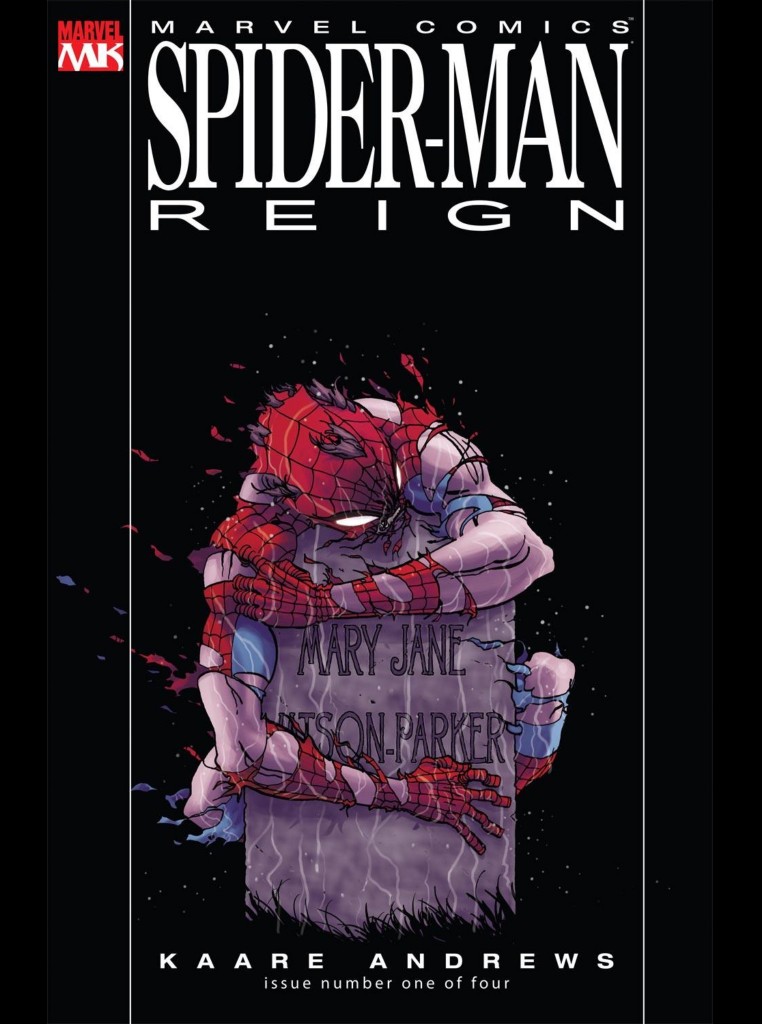
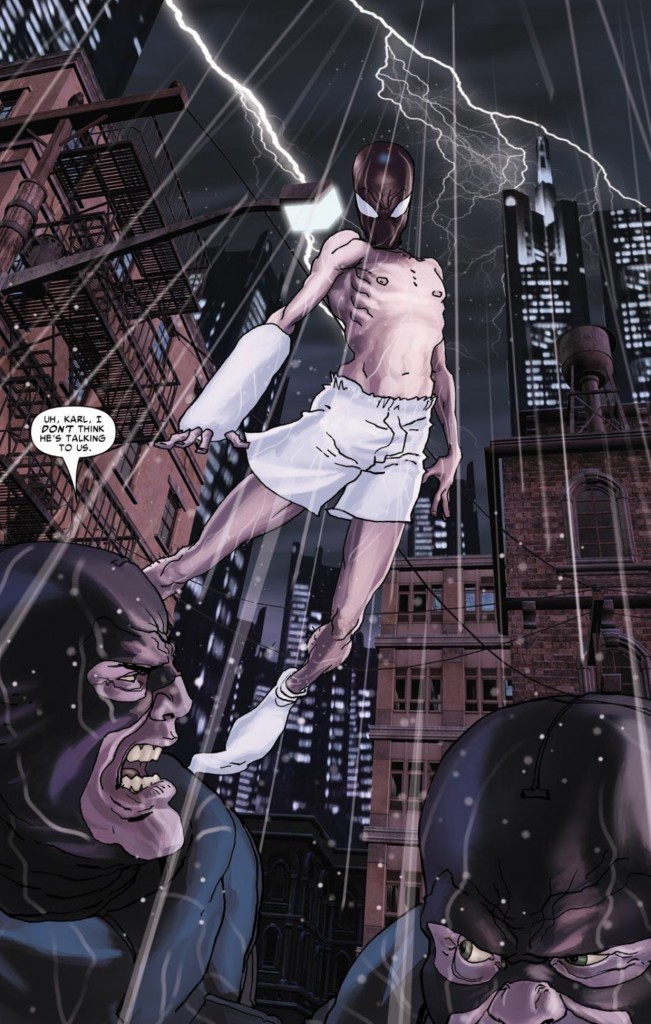
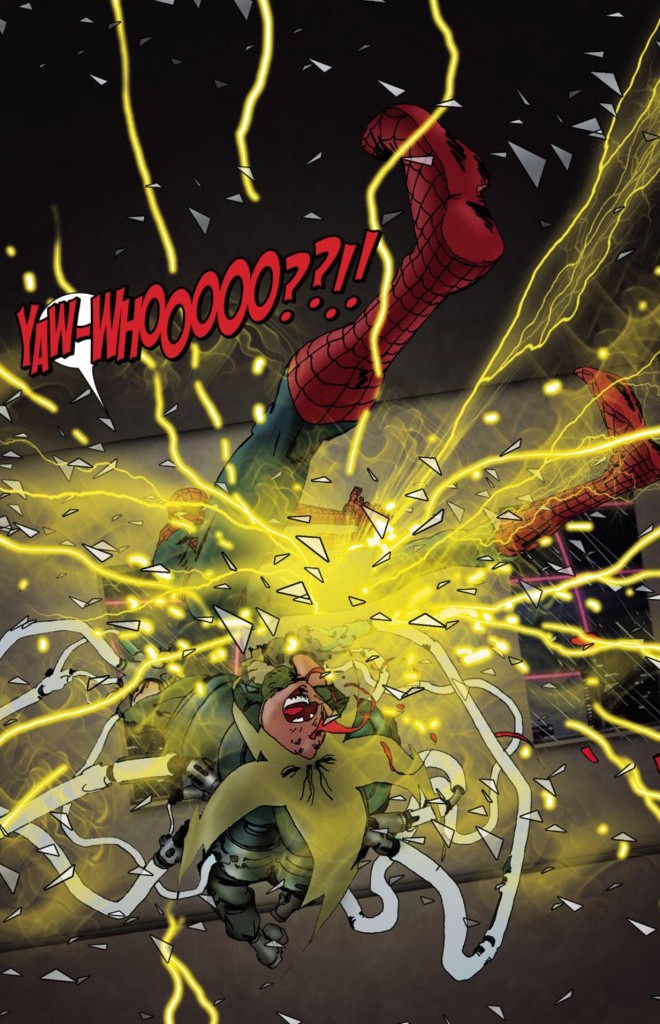
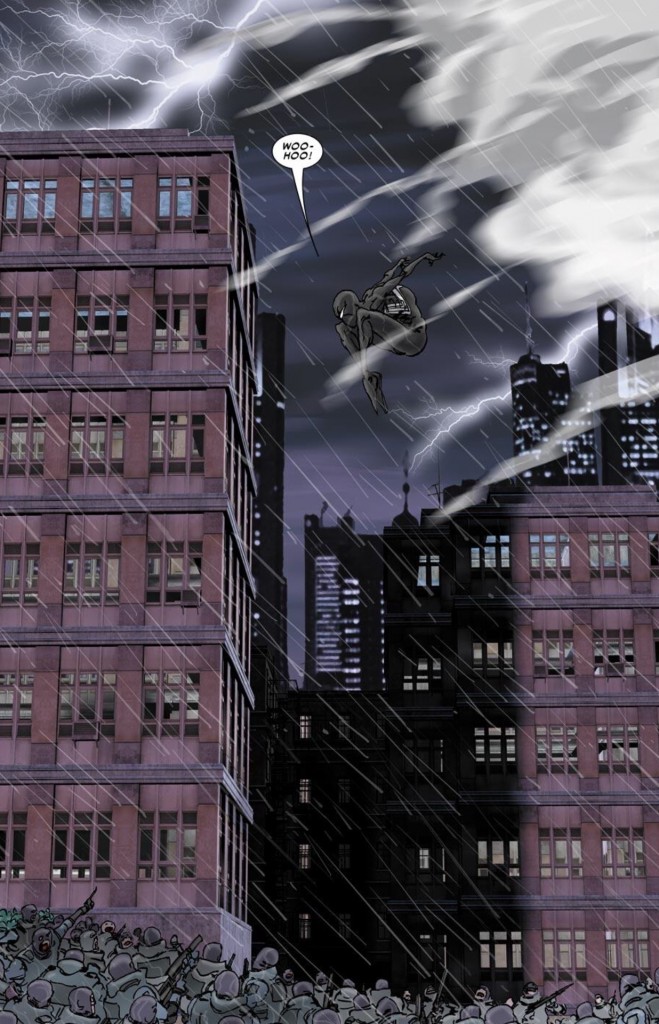
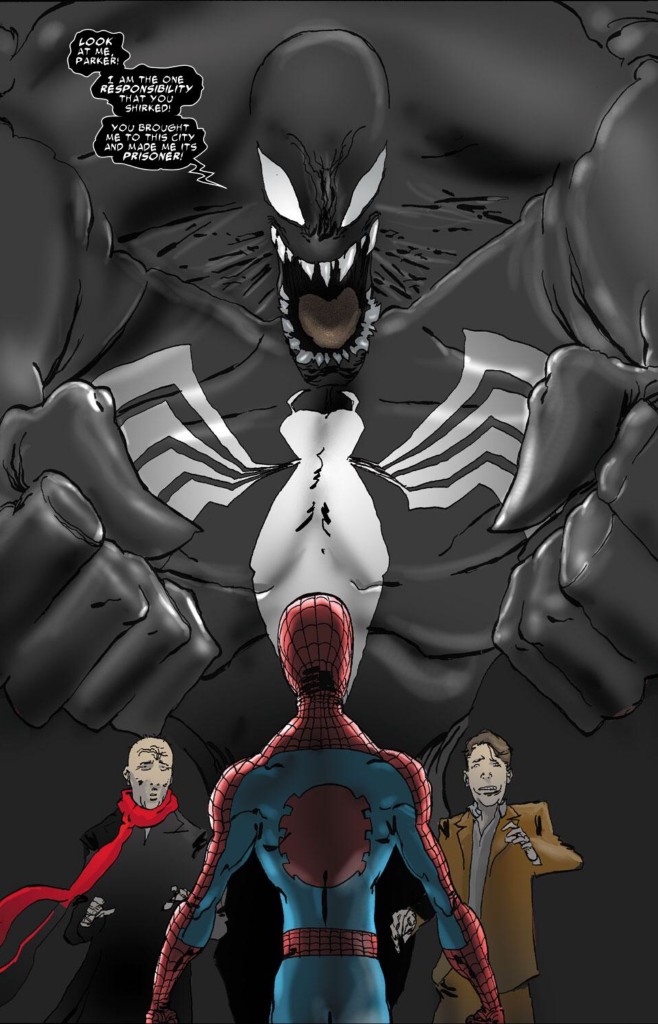




Well, I don’t want to go overboard defending Reign since a.) the debate has been done to death and b.) I last read it when I was 19 in 2007 and therefore don’t trust my opinion, but I think you’re being a little too harsh on the “radioactive sperm” thing. I highly doubt Andrews chose that specifically to be controversial.
Removing the absurd image that it creates, there *is* poetry to the notion that something so simple and natural as sex will have consequences for Peter Parker. It takes the responsibility thing one level further than letting a burglar go. Mary Jane’s death in Reign shows that loving someone – even at its most base level, without secret identities or scheming supervillains – has dire consequences for Peter Parker. It highlights that Peter has responsibility not just as a superhero, but as a normal human being.
The whole point is that her death had to be as direct as possible. It couldn’t have been the Green Goblin dropping someone off a bridge. So I give credit to Andrews for sticking to his guns, even if he had to know that implicating sperm was going to be a shitstorm. Annnnnd I do kinda thing people get too hung up on the details rather than the meaning, but that’s comic book readerdom in a nutshell.
I have to say I am not a huge fan of the radioactive semen plot point. But what I do like is how Reign really emphasized the importance of Spider-Man being funny and light hearted. Your argument on the story being bleak and out of place in a Spider-Man story was kind of the point. Was weird and u settling to see Spidey so depressed and dark. But when he accepted MJ forgiving him, he became the brighter, colorful Spider-Man again.
The main thing that absolutely NONE of DKR’s many imitators have bothered to copy is its craftsmanship. There are much longer, more articulate articles and essays out there, I can link to them even, about the amount of ambition and just great comic book storytelling techniques that went into DKR. How it plays with form and function, its use of lettering and narration to signify character state of minds, its innovative use of color to quickly inform the reader about where a panel is taking place, its clever transitions, the smart usage of the talking heads, how Frank and co utilized the 4 x 4 panel grid, the choreography of battles, the sound effect usage, etc. Its not a classic because it was DARK AND GRITTY. Its a classic because its an ambitious, exciting tale told with a powerful authoritative voice, by a writer/artist at the top of his game(he put out this, Born Again, and Elektra Assassin with his fellow artists within a year of each other, to put that in perspective), using radical kinetic storytelling that still remains an accessible superhero story.
Reign is like DKR without the intelligence, without the skill applied by Miller, Jenson, and Varley. Characters don’t speak, they announce their themes and ideas in bald-faced statements. Splash pages are used freely and liberally, with no attention to how effective they were in DKR. Plot beats are vulgar without being vigorous, dumb sight gags and terrible jokes, and character arcs that wither and die on the vine.
To me, its not just that its hilariously dark and nasty, its just a really terrible comic book, straight up.
Maybe it is because I never read DKR, but I really enjoyed SM Reign. Yeah, I don’t think it’s the best story ever (I found the ending rather dull, if I recall correctly), but it IS funny and a good reading.
About your point on responsibility, Mark, I do not disagree too much, and maybe that’s what I found in the ending clashing with the rest.
But.
Radioactive sperm.
It. Is. F***ing. Brilliant. :p
It is probably the biologist inside me speaking, but I really liked the idea. And no, it is not weird, just natural. As Yourself already brilliantly stated in his comment, I found it poetic that the same thing that gave Peter powers, is what kills MJ ultimately. And by means of the most intense act of love!
Also, to everyone that finds it stupid or nonsense or farfetched, should I remind you how Aunt May got sick because of Peter’s radioactive blood?
Of course if you want to go scientific, than the very idea of a radioactive spider giving powers with bite is nonsense. This is comics, afterall.